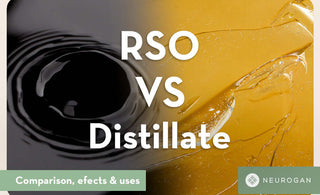RSO, or Rick Simpson Oil, is a concentrated form of cannabis oil. As you may infer from the name, the name was created by a Canadian engineer and medical marijuana activist named Rick Simpson.
RSO is typically high in tetrahydrocannabinol (THC), the main psychoactive compound in cannabis, though it may also contain other cannabinoids like cannabidiol (CBD).
A distillate, on the other hand, is a highly refined cannabis extract that typically contains a single cannabinoid, such as THC or CBD, in its purest form.
Distillates are created through distillation, separating cannabinoids from impurities, terpenes, plant materials, and other unwanted compounds. This process results in a concentrated, transparent, and viscous oil that can reach very high potency levels (up to 90-99% of the targeted cannabinoid).
What is the difference between RSO & Distillate?
While both distillates and RSO are cannabis extracts, they differ significantly in terms of production, potency, and in turn, usage.
Here are a few of the key differences between these cannabis extracts:
- RSO is a full spectrum extract, meaning it contains a wide range of cannabinoids, terpenes, flavonoids, and other compounds found in the cannabis plant.
- Distillates are isolated extracts that focus on one specific cannabinoid (often THC or CBD) and remove other compounds like terpenes, flavonoids, and minor cannabinoids.
- Potency in RSO products can vary depending on the strain of cannabis used and the method of extraction.
- Distillates are usually more potent than RSO in terms of the concentration of one cannabinoid.
- RSO is made using a solvent-based extraction process, typically involving ethanol or butane. The process is less refined, resulting in a darker, thicker oil that retains most of the plant’s compounds.
- Distillates are made through a more complex process involving fractional distillation, where cannabinoids are separated and refined at precise temperatures to remove unwanted compounds. This results in a clearer and purer product, free of solvents and impurities.

Effect Comparison
Due to the differences in extraction, production, and potency, these extracts offer different effects that may be more or less appealing to you, depending on what you’re looking for.
The broad range of cannabinoids and terpenes in RSO may provide a wider array of effects, including anecdotal evidence of pain relief support, relaxation, anti-inflammatory properties, mood enhancement, and potentially more wellness outcomes. Because of this mix, users often report a more balanced or well-rounded experience.
Distillates focus on one cannabinoid, which makes their effects more predictable and focused, meaning that the user will primarily experience the effects associated with the isolated cannabinoid, such as the psychoactive high from THC or the calming effects from CBD. It can be more difficult to describe the effects of distillates since it highly depends on the cannabinoid used.
Because distillates don’t contain a full spectrum of cannabinoids or terpenes, they might not provide the same range of effects or therapeutic benefits as RSO. The absence of other cannabinoids and terpenes can lead to sharper, more isolated effects rather than the layered experience provided by RSO.
Side Effects
RSO’s side effects may include typical cannabis-related effects like drowsiness, dry mouth, and mild psychoactive effects. Still, due to its full-spectrum nature, RSO may offer a more balanced experience with potentially fewer negative side effects like anxiety or paranoia.
The concentrated potency of distillates can result in stronger side effects, such as anxiety, paranoia, dry mouth, dizziness, or cognitive impairment (especially with THC distillates). Because of the high concentration of THC, users can easily consume too much, leading to an overwhelming experience.
Uses
Rick Simpson’s purpose in creating RSO was a part of his overall attitude toward making medical marijuana more accessible. This means that RSO is often used to support medicinal goals.
However, we should note that RSO still needs more research before we can advise consumers to use RSO medicinally. However, this hasn’t prevented RSO-users to rely on the testimonials of others to implement RSO into their wellness routine.
Making Products Using RSO or Distillate?
RSO focuses more on trying to meet long-term health goals, which is why it’s preferred for more regular use. Distillates are great for convenience and focused cannabinoid intake, but overall RSO is the winner in terms of everyday, long-term use.
Can you cook with RSO or distillate?
As both distillates and RSO are extracts, you can cook with both of them. However, they each have their own profile that affects the taste of a homemade infused goody or meal.
RSO has a strong, earthy taste due to its full spectrum profile. If cooking with RSO, you’ll also want to add it toward the end of cooking to prevent degradation of cannabinoids. We recommend dissolving RSO into fats like butter or oil.
Distillates often are considered flavorless, which may be preferable for some who want to consume a cannabinoid through an edible, but without the earthy taste that usually accompanies an infused edible. While it’s not advised to cook with distillates at a high heat, since they are refined, they are more heat-stable than RSO.
RSO or Distillates for Edibles?
Choosing between distillates or RSO for edibles is users’ preference, but we think RSO gummy edibles offer more. While distillates are often flavorless, which is a plus for some, they don’t offer the same potential benefits. Especially when you are considering the long-term potential of edibles in your daily routine. Since edibles offer longer-lasting effects, we think maximizing those effects is better to support you in feeling your best.
RSO or distillates for syringes?
RSO syringes are definitely more popular than distillate syringes. Oftentimes, when researching RSO, you will find syringe options. Since it’s so highly concentrated, and can be dosed with precision, some people prefer RSO syringe method.
Our Pick Explained - RSO
When we compare RSO to distillates directly, we end up preferring RSO ingestible products. While distillates offer a unique experience with an individual cannabinoid, we think there are benefits to the combination of cannabinoids.
Long-standing health practices have influenced RSO and can be integrated into a daily routine easily through a variety of consumption methods, giving the user the choice to fit RSO into their lifestyle.



